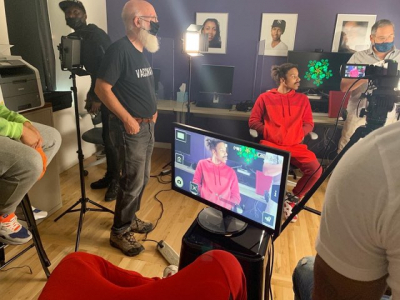Determined to Change: Hakim's Story

At the age of 21, Hakim found himself inside a jail cell for the second time in two years. In early 2021, jails & prisons were petri dishes for COVID-19 and New York City’s Rikers Island—one of the largest jails in the US—was not spared. Upon contracting the virus while incarcerated, Hakim hit rock bottom. He decided that when and if he got out, he was not going to put himself in a position where he would end up back in jail.
Determined to change, Hakim began researching how to productively reenter society upon his release. He needed stability in his life, along with a job and a safe space to live. After a month on Rikers, Hakim took a plea deal and was released. Using a brochure that he had picked up at Rikers, he called a local child services group, Rising Ground, which referred him to Avenues for Justice (AFJ).
Hakim grew up in Staten Island, raised by a single mother, along with two siblings. When he was just 12 years old, the trajectory of his life drastically changed. At a party with a group of older friends, gun shots rang out, followed by a chaotic scene wherein a state of panic, as he tried to locate his brother who was also at the party with him, Hakim felt a sharp pain in his back. He was rushed him to the hospital where he was treated for a stab wound. Hakim could not walk for the next three months. Less than a year after this attack, he was arrested at age 13 for the first time.
A couple of years later, Hakim’s best friend died of an asthma attack, something that is all too familiar in economically disadvantaged communities in NYC. After losing his best friend, Hakim struggled to concentrate in school. He couldn’t bear to see the empty seat that his friend used to occupy in class. Hakim dropped out of high school at the age of 16.
Struggling with grief and loss, and without daily structure or positive role models, Hakim started getting in trouble with the law. In his late teens, Hakim was arrested and released several times for minor robberies that did not result in any felony convictions or serious jail time. That changed in 2019. Hakim was convicted for Grand Larceny and sentenced to ten months in prison. After a rearrest and more jail time in 2021, Hakim got on the phone with AFJ Court Advocate Nora Mitchell asking how he could enroll in AFJ’s crime prevention program.
Hakim entered AFJ’s crime prevention program in May 2021 and is eagerly getting his life back on track. In July, Hakim began his six-week videography internship as part of the NYC Summer Youth Employment Program (SYEP) that AFJ is leading at our Lower East Side community center. Even though he had no experience in videography or video editing, he’s interested in exploring what careers are out there in the field. Hakim particularly enjoyed the class on documentary lighting taught by Anthony Bourdain’s director of photography, Todd Liebler, and noted his advice on how to get started in the industry. Despite his 3-hour round trip commute from Staten Island to Manhattan, (AFJ is covering the cost for his transportation), he is early every single day. Additionally, AFJ has provided him with gift cards to help with groceries and lunches since this has been a source of stress for him at home.
One of the ways Hakim now works on his mental health at home is through exercise. While he was at Rikers, another inmate taught him the importance of physical activity. Now he takes the exercise routine his mentor taught him to the park every day, for a break from his crowded apartment and to add control and independence to his life. He is eager to spread what he has learned about the connection between mental health and exercise and has chosen this for the topic of his film he’s making for SYEP. AFJ is exploring further opportunities for mentorship and employment at several local gyms and exercise centers.
After his SYEP internship finishes in August, Hakim wants to finish his GED and potentially go to trade school for engineering. In the meantime, he is interested in moving to Manhattan. He wants to get out of Staten Island, where he feels there are only negative influence, and be closer to services like AFJ. He says that he has never had role models like Nora and the other court advocates – they feel like family to him.
Hakim says that his best friend is his mother, and after everything she has watched him go through, she is so proud of the strides that he is making with Avenues for Justice to start a new life for himself.



